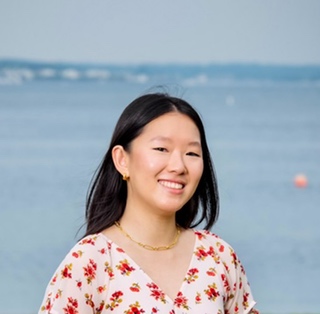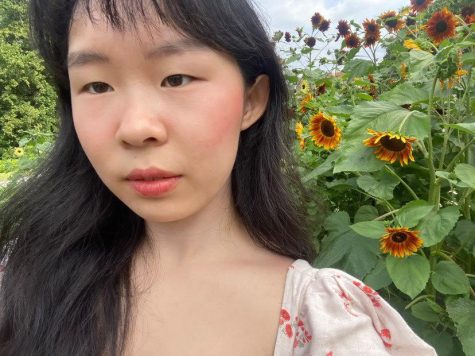Notable Alumni Interview Series #6: Grace Q. Song

November 3, 2022
Grace Q. Song is a writer residing in New York City. Her poetry and fiction have been published or are forthcoming in The Boiler, The Journal, The Offing, The Minnesota Review, The Cincinnati Review, Poetry Northwest, and elsewhere. She studies English at Columbia University.
Sophia Liu: When did you attend Great Neck South High School? What was your most memorable experience?
Grace Q. Song: I attended Great Neck South from 2017 to 2021. I really enjoyed being in my favorite teachers’ classes such as with Mr. Ko and Ms. Hastings and receiving a lot of support from them. I also really enjoyed going to all of the performances, especially the musicals and operas where I would play in the orchestra pit. I remember when Mamma Mia was put on, I had never seen Mamma Mia before. I didn’t know anything about it. But when I saw it, it was amazing. I loved all the songs and everyone was such a great actor. The music was catchy and actually spurred my interest in ABBA. It was so fun being able to participate in these community events and really appreciate how much talent we have at the high school.
SL: Was there a teacher at South that particularly influenced you?
GQS: Mr. Ko, I think, is like the archetype of a mentor. He doesn’t have a beard, but he’s very experienced, wise, and caring towards the students. He’s dedicated towards challenging students and having high expectations of them, while simultaneously caring for them and supporting them along the way. Ms. Hastings was just a good teacher. She understood all the pressures of performing academically well in school, and she wanted to devise a healthier and more supportive system that would work against that. I really commend her for embarking on this whole new grading system and teaching style 20 years into her career and just taking that leap of faith.
Another person that was really instrumental in my writing was Mr. Amelio. He was probably one of the first people that I showed my poems to. He read them and he said they were amazing. When I look back on those poems that I wrote four or five years ago, I’m like, these are so trash, what are you talking about? I think it’s really amazing for someone to read something of yours and see beyond the words and see a spark of talent and believe in you before you believe in yourself. Those of the type of people that you want to have in your life, even outside of school. You want someone to champion you and see beyond what you can see in yourself.
SL: That’s so sweet. Can you talk about your experiences in clubs or sports at South?
GQS: I wasn’t really a sports person. I am the farthest thing that you can get from an athlete. My main club was Exit 33. I started out as a secretary my freshman year and going into junior year, I was Co-Editor-in-Chief with Benjamin Rossen. My senior year, after Benjamin graduated, I became the Editor-in-Chief. It was just really amazing. I think that either in my freshman year or sophomore year, Mr. Moran stepped up, and he became the advisor of Exit 33 after the previous adviser retired. Being able to work with Mr. Moran and other people on a project that we were all really passionate about was really cool. During the pandemic, we needed some adjustments and I’m pretty proud of how we navigated that whole situation through Google Forms in terms of voting and creating a digital space for artists and writers. I had the honor of being in that position and being entrusted with everyone’s work and everyone’s time.
The other main thing that I did was play in the orchestra pit for the operas and musicals. It was definitely very, very tiring, especially the week of the show because we would have to stay in school until 10 pm every single day, but it taught me how to manage my time. Being a part of this creative process of producing art entertainment, and seeing the seats filled up, and the curtains rose, and the audience’s excitement, was very fulfilling. It’s seeing the fruits of your labor and being able to give back to your community in a way.
SL: You were a wonderful Editor-in-Chief. You write both prose and poetry which is so exceptional because most people, like me, struggle to write one. Which came first and do you approach poetry and prose differently?
GQS: I think prose naturally came forth for me because I read a lot of fiction when I was younger. I started off by writing fanfiction on Wattpad in middle school, but we don’t need to talk about that. Then, in high school, I started writing poetry and that’s where I’m still at. Poetry has been the one that I was really focused on and that I’ve been trying to refine and learn the craft of. Towards the end of high school, I did go back into prose writing.
But having worked in poetry for a long time, where the whole point is to choose the best word in the order of words and view the world in a particular way, I lost some of my longer prose writing skills. When I went back to write prose, I couldn’t anymore because all the sentences felt weird. For example, a sentence like “Mary went into town to buy shoes” just doesn’t make sense in my head. I was talking about this with one of my professors last year, and he said poetry is all about tension. With poetry, each line stands on its own. But with prose, you have to be able to write the most mundane and boring sentences to create a story. That’s why a lot of the prose that I write is shorter. I haven’t written much prose in college, but it’ll come back, I’m sure.
SL: What stands out about your work is that the language is fairly simplistic, but you’re able to elicit such arresting images and emotional responses, similarly to the work of Mary Oliver or Louise Gluck. Can you take me through your writing journey and how you have arrived at your current style and craft?
GQS: I was able to develop my style through reading a lot. I’m subscribed to daily poetry newsletters from Poetry Foundation, Poetry Daily, and the Academy of American Poets where they send a poem every day to your email. I would have so many poems in all different styles, subjects, time periods, and genres. The variety of poems helped me realize which I liked and which ones I didn’t. I would delete the ones I didn’t like and save the ones I did. Through that, I built up a repertoire and noticed the common threads of what I liked.
I’m not very experimental. I don’t write in certain styles and I think my poetry is very simple. My style is influenced by all the work by poets I love like Dorianne Laux, Ada Limon, Kim Addonizio, Jericho Brown, Cynthia Cruz, and others. I would use their poems to figure out why I really liked them, which is how I learned a lot of craft on my own. I would read through the poem again and again and figure out why it was so amazing, asking myself what techniques did the poet use, what is their structure, how do they set up their metaphors. Then, I would use those techniques in my own writing.
When I moved to Columbia and began college, I felt like a very distinct shift in my writing, in terms of subject matter and style, which I think is very normal. You have your trademarks and consistencies in writing, but it’s very natural to experiment and not have the same style and voice across decades. I still experiment and step outside of my comfort zone—trying new styles, breaking my poems into more white space, etc. Experimenting gives you a different perspective. You have a chance to discover something new. Don’t box yourself into a category, because it’s too early for that. When I think about writing, I just literally write about whatever I want. I don’t care if my writing is sometimes more surreal, or edgy, or pop-culture-y.
SL: One of my favorite poems of yours is “Self-Portrait as a Studio Ghibli Soundtrack,” which has a lovely musical quality. As a flutist, how does music intertwine with your writing?
GQS: There’s definitely an overlap between music and poetry. Poetry has very deep oral traditions and roots. Homer’s Odyssey, for example, was sung out loud and not read in its original forms. The lyricism and musicality of poetry, the way that it sounds in your head and when you read it out loud is very important to a poem. I love music and sometimes when I write a poem, I will listen to a very specific soundtrack that will put me in a mood. The music of that piece will bleed into the poem.
SL: There are many issues with the teen writing sphere such as its competition, its elitism, the pressure to write about cultural or familial trauma, and the pressure to publish young and consistently. How have you dealt with the pressures of writing competitions and publication? How do you foster a healthy mindset towards writing?
GQS: I feel like the pressure and the competition will always be there and honestly only get worse with the increasing pressures of college admissions. I think it’s really important to realize that the system is flawed. If you read through like the winners of these very prestigious competitions, like Scholastic and Youngarts, you will notice certain trends. The judges are reading with a very specific lens of what they want to promote and what they think is the best writing. Writing is very, very subjective and recognizing these competition’s agendas can help give you a different perspective. For example, a good “diaspora” poem is very celebrated and exalted. That’s what Daniel Liu wrote about in his essay. And quite frankly, those poems are so duplicated and people plagiarize it all the time. You have to recognize that if you don’t write a “diaspora” poem, you are probably not going to win, which allows you to take a step back and think about what is really important in life. What do you want to prioritize? What do you even want to write about? It allows you to reevaluate your relationship with recognition.
There is no one path to success, or to anything. Just because you didn’t win Youngarts doesn’t mean you’re doomed forever. Just because you didn’t get a Scholastic gold medal doesn’t mean that it’s time to start burning those notebooks. I never was a Youngarts Finalist and I never won a Scholastic gold medal. I didn’t even win anything on the national-level from Scholastic until my senior year after I submitted for four years. Detaching yourself from recognition from all these competitions is something that I would encourage young writers to do. You have to realize that in the end, you are not competing with other writers even if you are all in this race together. There may seem like there is a finish line with an award or something, but there isn’t.
It’s important to not see the people around you as running against you, but running alongside you. They’re not your rivals, but your friends. My writing friends have enriched my experience so much. We will send each other tweets about which literary magazines or contests are open for submissions and support each other.
SL: Now for a round of quick-fire questions! What’s your favorite poem you’ve read in the last week?
GQS: “Language: A Love Poem” by Stephen Dunn
SL: Favorite literary journal?
GQS: Smokelong Quarterly. They’re very consistent in their flash and micro stories they select and publish.
SL: Last book you finished?
GQS: I just reread Conversations with Friends by Sally Rooney for one of my classes. I read it before, but rereading is always such a lovely experience. You’re able to relive the process of reading it for the first time. I was able to understand the main character on a deeper and more intimate level.
SL: Best coping mechanism after receiving a rejection from a literary journal?
GQS: I screenshot the rejection email and send it to my friends. I tell them how sad I am. But it depends on the rejection. Usually, I just delete the email and update my spreadsheet where I track my submissions. Out of sight, out of mind.
But sometimes, when I receive a tiered rejection that says something like “we liked your work, but we’re going to pass,” which is sort of encouraging, but ultimately I didn’t make it, I become really sad. Eventually, I get over it. When you have submitted enough and done it for a while, the rejections don’t really matter anymore. They become a normal part of life. You detract yourself emotionally from these rejections.
But do whatever you have to do to get over rejection and decompress. Eat chocolate. Submit that piece to another 10 places.
SL: Favorite assignment at South?
GQS: This is an unpopular opinion, but I really liked the research papers, especially in 11th and 12th grade. After I finished, I would be really proud of myself and think “Wow, this is amazing. Look at all of these pages I wrote about Jane Eyre.” This is probably my English major talking through me, but I enjoyed being able to dig into a book, make an argument that I formulated, defend it, and write a well-structured, creative essay that I could later step back from and feel proud of.
SL: Lowest grade you received in high school?
GQS: I think I failed a Geometry test in 9th grade, so below an F.
SL: Favorite ice cream topping?
GQS: I don’t really eat ice cream with toppings. My favorite ice cream brand, by the way, is Van Leeuwen. But if I had to choose, I would go with mini chocolate kisses.
SL: That’s it! Now back to our normal programming. College is obviously a point of great stress to many students. Can you talk about why you chose Columbia, how you decided on your major, and how your transition to college was?
GQS: I’ve lived in New York my entire life, and I really love it. I was really excited to live in a city, and all of the schools I applied to were in major cities. I’m probably going to live and die in New York. Living in New York is honestly a once-in-a-lifetime experience. You have everything here—it’s the finance and art capital. As someone with a fast-paced personality, I love the energy, vibrancy, and drive of New York.
Ever since I’ve taken writing more seriously in high school, writing became the only thing I pictured myself majoring in. I don’t feel like I’m good at anything else—I’m not good at math and I don’t find interest in the sciences. It felt appropriate to major in English.
For me, the transition was fine, but orientation week was definitely overwhelming. As an introvert, I’m sure extroverts were fine, but it was overwhelming meeting new people. During orientation, you basically shop around for friends, but most of the people you meet you forget and you never see again. Once orientation was over and I started classes, everything calmed down. Great Neck South provides a very good education in terms of rigor. I don’t think you will struggle in college academically. At least in my major, everything is manageable with time management. Other majors though, especially science majors, are still rigorous regardless of how your high school prepared you. Still, it is absolutely possible to do well in school and have fun.
SL: What advice would you give to high school students, young writers, or anyone in the process of figuring out themselves and their future?
GQS: A lot of high school is obsessing over grades and other things to get into college. I think that people take it too seriously. Just because you get a C on a test, it doesn’t mean you’re going to go to community college, not that community college is bad. College is what you make of it, not where you go. What really matters are the opportunities you take, the paths you carve out for yourself, and growing and getting to know yourself, which you can do anywhere. It’s important to enjoy high school. Go to the school shows. Watch movies with your friends, go to the museum, do whatever that you enjoy and makes you happy. The years will pass faster than you think and there’s so much you’ll miss if you’re just focused on a single target.
Other advice: Learn to cook. Apply sunscreen. Read a lot of books.
SL: Lastly, can you speak about your future plans? What are you hoping to experience or accomplish in the next five, ten, or fifty years?
GQS: I want to finish college and oddly, I want to work. I weirdly look forward to working because I want the experience of working and being independent. I’m trying to get into the financial consulting sector and do writing on the side. I don’t know if I’ll ever get an MFA. I think that’s a luxury that I don’t know I can afford. But I do want a graduate degree at some point in my life. I want to stay in New York because I love it. I want to publish a poetry collection someday, but I’m not sure when.







